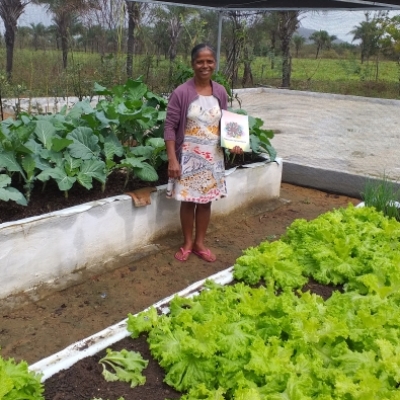My Stories
Hilda dos Santos – Bahia

Hilda dos Santos, 52 years old, lives in the community of Cornicha, in the rural territory of Giro da Serra, in the municipality of Ponto Novo/Bahia. The municipality is part of the identity territory of Piemonte Norte do Itapicuru. Dona Hilda is married, has four children, of whom two daughters live in nearby communities, and the other two sons are working outside the state. Hilda, the daughter of peasants, had little access to formal education, but is called by many a doctor of the land, vegetables and medicinal plants.
Hilda’s work routine is heavy, she says “my routine is very busy, when I wake up, I wash my eyes, I make the coffee, then I go outside, take care of the yard and the plants, I see if there are any pest, I take care of the vegetables, I plant, water, I remove the ones that are suffering attacks from insects and diseases. Then I take care of the chickens, feed them. I take advantage of the cold sun early in the morning to take care of things outside. Then I go inside the house to take care of it, cook food, sweep the house, wash the dishes, this is my day-to-day routine. Hilda adds, still, in the late afternoon, I go back to the backyard, water the vegetables, and take care of the fruit trees, and sometimes, I still go to the fields, weeding, planting and harvesting”.
Hilda's routine is added to her participation in the Ponto Novo union meetings, in the community's religious activities, in the territory association meetings, as well as in all the training activities carried out by the Pró-Semiárido project: workshops with themes in the productive and sociocultural area, learning circles, and meetings of the Giro da Serra rural women's nucleus, which aims to monitor research using agroecological notebooks.
Hilda is a farmer, and they are monitored by Continuing Technical Assistance, through the Pró-Semiárido project, which is financed by IFAD, and the government of the State of Bahia, through SDR/CAR, in partnership with the CACTUS entity, in which refers to continued technical follow-up. The farmer was contemplated by the project with two social technologies, which, according to her, are contributing to food security and improving income. The same is participating in the research with the agroecological notebooks.
For Hilda, participation in the union and in the association is very important, she says: my feeling is that the association is always part of life, of a benefit, of a project, it is always very good to participate, right? Because you learn more, also listening to what you need and what we should do, I feel very good about participating in the association of farmers in Santo Antônio.
The agroecological booklet is an instrument for measuring the activities carried out by women, created by the Center for Alternative Technologies in the Zona da Mata – CTA/ZM, with the aim of giving visibility to the work of family farmers. It records the consumption, exchange, sale and donation of what is grown in agroecosystems.
Hilda says that she aroused interest in making notes in the agroecological notebook, from a meeting that the Pró-Semiárido/CACTUS team, through field technician Thaise Pereira de Matos held in the Giro da Serra territory. She states that she needs to have control over what she is producing, consuming, income, which contributes to some household expenses, such as the water bill, energy, and purchase of cooking gas, as well as knowing which products and how much make a donation. Dona Hilda also adds that taking notes in the agroecological notebook works as a therapy. Guarantor is enjoying making the records and notes.
The farmer affirms with conviction that the social technologies she received, a sidewalk cistern, a rustic aviary, along with the continuous technical support they have had for two years, changed her life for the better. He adds: “my life has improved a lot, after I received the cistern, it is very good, because I have my healthy food to eat, and to feed my family, I stop buying products with pesticides in the markets and fair, I sell some of the production and I pay some household bills, I want to improve more and more”.
Report produced by the Pro-Semiárido Project team.


